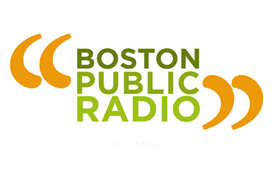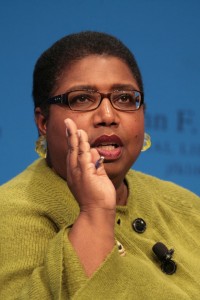Fuse Commentary: WGBH — No Excuses
WGBH is not even attempting to make any excuses, not bothering to put in the energy to explain why the station isn’t using funding from its supporters to hire first-class journalists or to create news programming that builds community and educates because it challenges, investigates, and digs deeper into the world around us.
By Bill Marx.
In other major changes made by public radio station WGBH, there were some attempts from the higher ups to tell the groundlings, ignored most of the time but necessary for fundraising purposes, the reasons behind the moves. But there has been little comment from WGBH management regarding the decision to cut back on its respected jazz programming by axing Steve Schwartz and turning Eric Jackson into a part-timer.
No doubt it was planned this way, the corporate muckamucks making sure that the predictable outrage would be greeted with silence while they were off vacationing, perhaps at their summer homes on the Cape, sipping cold drinks and snatching perfectly spiced shrimp from the barby, comparing notes with other power players on even more effective ways to cut costs and contain the union while collecting as much cold hard cash (donations and underwriting) for as little investment in local programing as possible. It is how they relax, and they are very good at making the minimum look like the maximum. The front office types have a right to bask in the dewy sunshine—after all, the bottom line is that they owe the New England community nothing but NPR shows and other syndicated programming at competitive times of the day. The rest is window dressing for the gullible. And listeners are buying it.
But the lack of response could be a sign of embarrassment, a fear of ridicule. The purpose of WGBH is no longer about arts and culture, and it isn’t about creating quality local news and educational dialogue—it is about raking in as much money as the station can by serving up syndicated programming that can be heard on WBUR or elsewhere. (The latter puts a time limit on the scam: technology will increasingly make it easier for listeners to get their NPR/national programming without having to deal with WGBH.) The bottom line—that the business of WGBH is business—is so obvious, so undeniable that there is nothing to say. Even the spin of well-paid flacks can’t make the straight antenna of the truth bend any other way.
You want proof? First, here is a recent response from a mid-level WGBH bureaucrat to a listener who threatened to stop supporting the station if jazz programming was slashed. It was posted on a Facebook page dedicated to “Save Eric in the Evening.”
Thank you for sharing your thoughts regarding the shifts in the 89.7 WGBH lineup. I understand your unhappiness about the decision to focus jazz on the weekends—it was not an easy choice to make.
Whenever we adjust our programming, our true consideration is how WGBH can best build on our educational mission, which includes expanding the dialogue and discussion of important ideas and topics facing our neighborhood, our region, and the world. We believe public media has a responsibility to present a diversity of perspectives, adding voices from different sources to enhance those critical conversations.
Of course, beyond the daily discussions of news and public affairs is the human need for contemplation and reflection. Music and art provide this, which is why WGBH is maintaining our 40-year commitment to jazz, though in a narrower programming window.
Eric Jackson will use his three nights on 89.7 (9pm to 12midnight) to continue to expose and support local jazz artists and venues. As always, he will produce interviews with both emerging and established artists, as well as exciting live performances (including from our Brighton studios). And we are planning to include the “dean of Boston jazz” as a part of our local talk shows and news programs on 89.7, so a wider listenership can learn about the art form you, he, and so many others love.
You are a valued member of WGBH, and we ask that you reconsider canceling your membership over the change in jazz programming. While our jazz programming has a dedicated following, a diminished support level is partially responsible for the shift to the weekend format. We ask for your continued support so that jazz may maintain its new time slot and continue to enlighten and enthrall for years to come.
Again, thank you for taking the time to write and please don’t hesitate to contact Audience & Member Services should you have any further questions, comments or feedback.
The double talk here is creepily Orwellian. Cut back on Eric’s jazz programming but put him on talk shows from time to time? How does that kind of shell game further the station’s “educational mission”? Take the music away, shatter the local community Eric’s program has built over decades—and make up for it by bringing him in on occasion to answer a few questions? That is just how the arts are ghettoized in the mainstream media. Further developing the latter point, there’s the patronizing description of the arts as answering “the human need for contemplation and reflection.” Apparently, that kind of strenuous mental exercise for WGBH listeners is reserved for the weekends. (During the week you just swallow whatever WGBH and its surround-sound talking heads tell you.) Ezra Pound said that great literature (and I would add music and the other arts) is news that stays news. Anyone who loves or cares about the arts agrees with that sentiment.
And, of course, there’s blame the victims—if only you had given us more money, the letter suggests, jazz would be around. But why isn’t it WGBH’s fault as well? Citizens Bank is paying big bucks to bankroll the upcoming WGBH/Boston Globe co-presentation of a Summer Arts Weekend. (I will give the station credit for consistency—no arts on the weekdays.) Couldn’t anyone at the station convince the honchos at Citizens or another big New England bank that jazz on the station was worth supporting? As much as a visit from Susanne Vega? I suspect that nobody at WGBH did or cared. It is money WGBH is after—not educating the community or encouraging critical voices.
But let’s look at the commitment to the New England community via the new show, Boston Public Radio, two hours of gab modeled on Cable TV, though there is much less crappy phone sound on TV. Here is the description on the WGBH website of the program, which premiered today. It will be rebroadcast this evening:
Start your engines: Monday, July 9 marks the start of our new, seamless midday show: Boston Public Radio, from noon to 2 p.m. every weekday. It’s led by Callie Crossley with Emily Rooney and other WGBH contributors to delve into the day’s top headlines and showcase a breadth of opinions. Kara Miller of Innovation Hub will be in twice a week to uncover new ideas and potential solutions to today’s challenges and Edgar Herwick will review what’s going on in the local music scene.
Note that Edgar Herwick (who he?) is reviewing the local music scene, not Eric Jackson. Glad to hear that “new ideas and potential solutions to today’s challenges” is covered by Kara Miller. Talk about one-stop shopping. I assume we reflect on and contemplate her wisdom during the weekends . . .
Here is what we got today, in all its community-educational glory, on Boston Public Radio. First, the typical gas bag session hosted by Emily Rooney about local politics with really diverse voices—David Bernstein from The Boston Phoenix and Rob Eno from Red Mass Group. The usual see-saw confab: one thing you are guaranteed not to hear amid the cud-chewing—any original investigative journalism. Then came the diverse voice of Kai Ryssdal, talking about economics—the first of two shameless plugs that day, given that Ryssdal is the host of Marketplace, a syndicated program that WGBH carries a half hour before WBUR broadcasts it.
More critical thinking and educational voices arrived with linguist Ben Zimmer, who “looks at how today’s politicians are getting extremely casual and faux-familiar when it comes to communicating with us in email and in cyberspace.” Hardly a world-shattering issue, though it gives mainstream media types a chance to sound up-to-date because they can chat about “cyberspace.” Then marched in one of the numberless presidential gossip sessions we are in store for up until November, featuring a professor from Emory College who wrote an article for The New York Times on Obama’s lack of passion. Dorie Clark of Clark Strategic Communications chimes in. A perfect segment for MSNBC—how does this serve the New England community?
Finally, the second plug of the day arrived—for a PBS Frontline program entitled ENDGAME: AIDS in Black America. The TV show could be very good, because Frontline features investigative reporting. None of that kind of thing on Boston Public Radio, which is essentially a promo service. That’s why Frontline is worth supporting and Boston Public Radio isn’t.
There really is no defense for this kind of lazy programming. We lost great jazz for dime store chatter mixed with corporate-approved publicity.
You would think that WGBH would want to kick Boston Public Radio off with a bang instead of a cheap murmur. But WGBH is not even attempting to offer any excuses, not bothering to put in the energy to explain why the station isn’t using funding from its supporters to hire first-class journalists (there are many around the country looking for jobs) or to create news programming that builds community and educates because it challenges, investigates, and digs deeper into the world around us. WGBH is hunkering down, serving up mediocrity, and collecting the money, as long as it comes in.
More on the latter point in an upcoming column.



this is the third time that WGBH has betrayed boston’s music community.
1. they cancelled “Blues after Hours.”
2. they cancelled folk music programming.
3. and now they massacre the jazz programming.